Pen’s tribal children are hitting puberty even before their teens begin, and their parents are too busy to supervise. Pregnant at ages as young as 12, they are forced to make the hard choice between underage marriage or abortion

The police said that despite cases being registered under the POCSO Act, the girls’ families often refuse to cooperate during the trial due to community pressure. Representational pic
Teenage pregnancy is a dark reality for residents of tribal hamlets in Pen and nearby talukas of Raigad district, where every month on an average five-10 minor girls in the age group of 12 to 17 years are becoming pregnant —a fact that comes to light when they miss their menstrual cycle and visit the primary health centre or rural hospital, where tests confirm pregnancy.
ADVERTISEMENT
The irony is that most of the girls are either school or junior college students, and their partners are youths barely older than them. Sex with a minor is an offence under the POCSO Act and though the police in a few cases register an FIR, pressure is built on the survivor’s parents to not register the case, or settle the issue by getting the accused married to the girl—thereby encouraging child marriage, which is also an offence under the law.
Seventeen-year-old Radhika (name changed), a class XI student, missed her menstruation cycle in October. En route to her junior college, she visited the Sub District Civil Hospital in Pen, where Dr Suraj Mhatre who was on duty gave her a self-testing pregnancy kit.
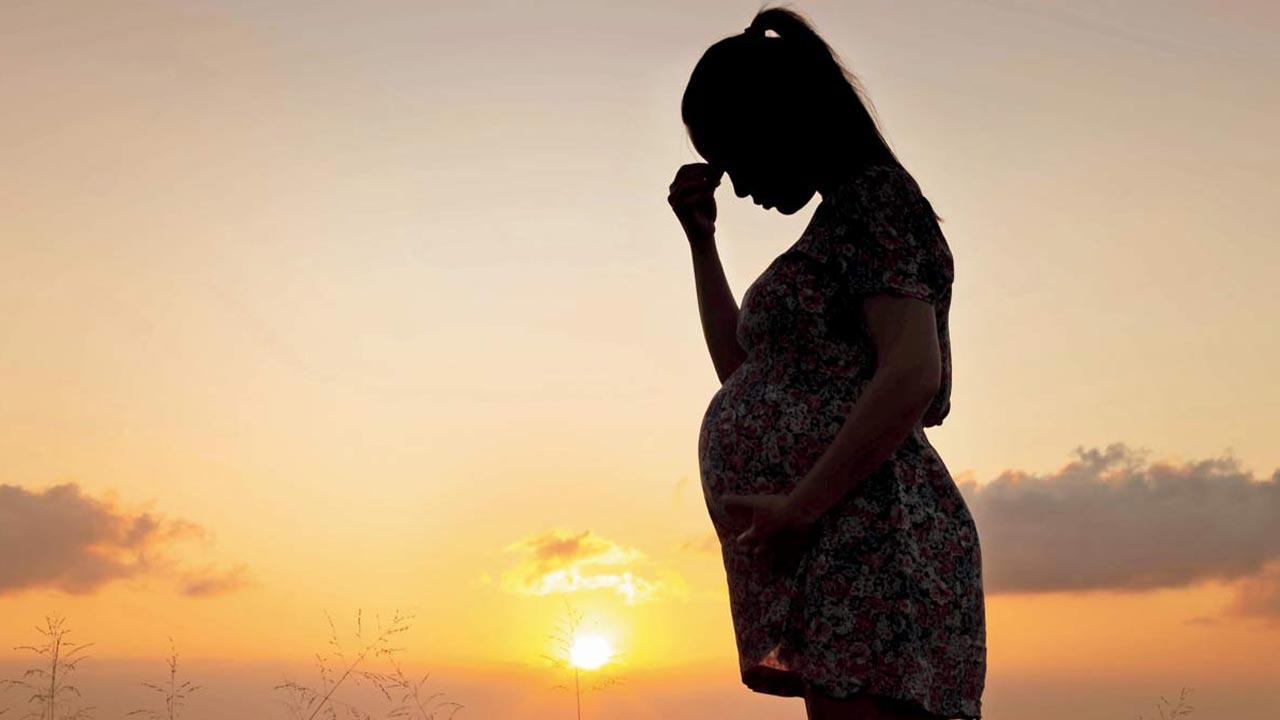 Pic/iStock
Pic/iStock
“She was in her college uniform, and when she learnt that she was pregnant, it left her in tears,” said Dr Mhatre. Under the law, he was bound to inform the police, which he did.
“On an average, around five or more cases of unwed teenage pregnancy get reported per month at the hospital, and most of the girls are from the tribal hamlets,” the doctor added.
“Once the police and parents are informed, the swabs of the minor victim are collected and the accused medically examined, as and when brought by police. The victim is referred for counselling, and the police register an offence. But the efforts of the police and doctors to counsel the girls and parents, are often in vain as
family members and the community put pressure on them to not pursue the case. Even if a case is registered they tend not to cooperate during the trial,” said Dr Mhatre.
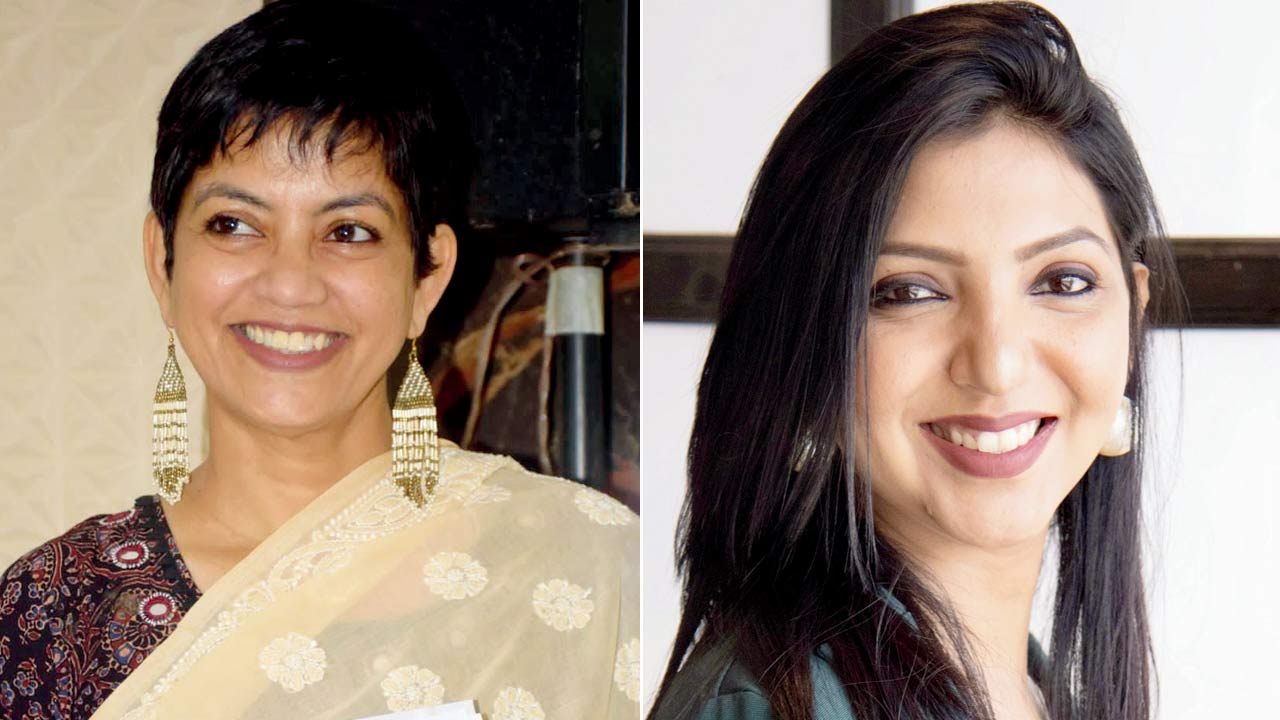 Adv Audrey DMello and Adv Mohini Priya
Adv Audrey DMello and Adv Mohini Priya
Dr Netra Patil, a medical officer attached to the Primary Health Centre at Kamarli, said an added complication is that most of the girls are anaemic and in some cases malnourished, too.
“On an average we get around three to five cases of pregnancy in school and college-going girls under 18, who complain of stomachache, sudden vomiting, missing their period, etc. We refer these cases to the district civil hospital in Alibaug as our centre is not authorised to carry out sonography,” said Dr Patil.
Some tribal hamlets were reporting a regular inflow of teenage pregnancy cases—for example, nine cases in June 2024, six in August, seven in September and 10 in October—“shocking data from just our primary health centre”, the doctor added.
One reason for sometimes repeated pregnancies in the same girl, Dr Patil said, is the practice of having a live-in-relationship before marriage in some tribal hamlets.
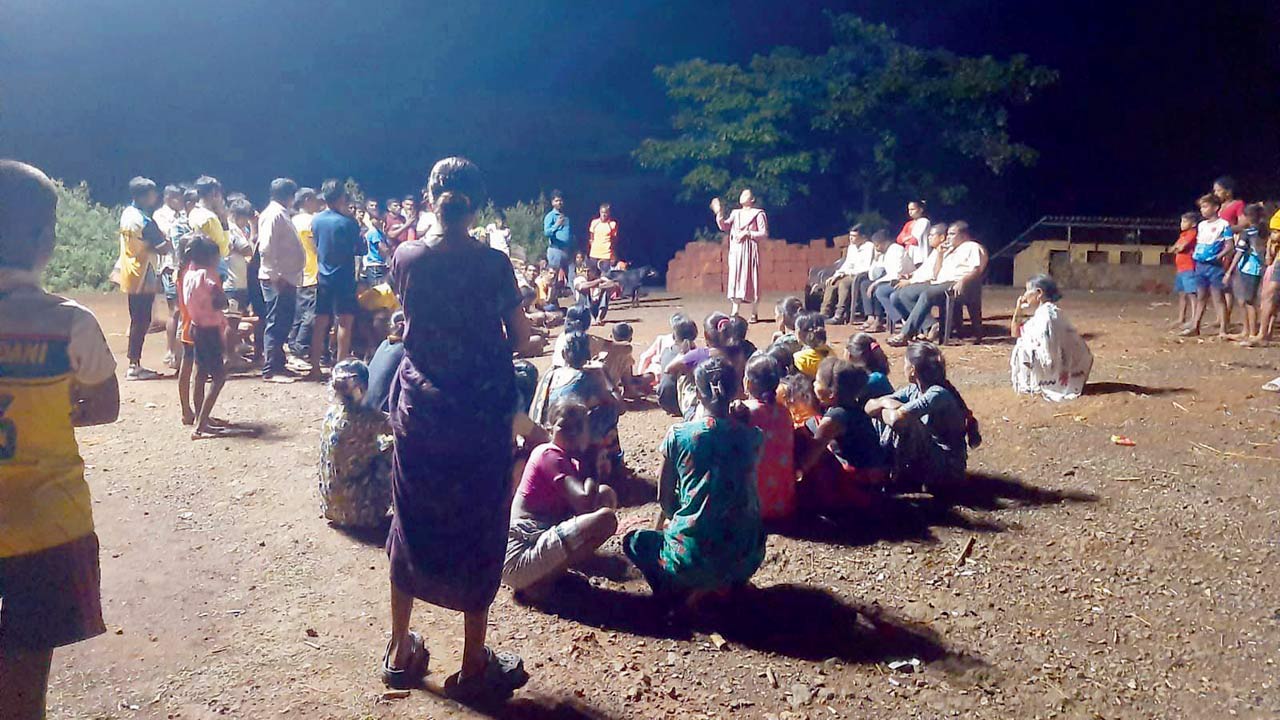 Activists conducting an awareness camp for tribals in one of Pen’s hamlets. Pic/Courtesy Santosh Thakur
Activists conducting an awareness camp for tribals in one of Pen’s hamlets. Pic/Courtesy Santosh Thakur
Other factors, said Dr Archana Singh, psychiatrist at the Civil Hospital in Alibaug, include the use of oxytocin in cattle. This hormone passes on to humans through the consumption of milk, and is believed to have induced early puberty in both boys (12 years) and girls (10 years). This brings on sudden hormonal changes and increases their sexual drive as well. “Moreover, in many families, both parents are working and there is no adult supervision of teenagers. Easy mobile phone access with free data connectivity makes online pornographic content easily available, and lures young boys and girls into physical relations,” explained Dr Singh, who counsels most of these victims during her weekly visit to the Sub District Civil Hospital in Pen.
Dr Singh added that the situation is complicated further by the practice of child marriage in certain communities within the Adivasis, who believe that sexual intimacy before marriage is a sin.
Santosh Thakur, founder president of Gram Sanvardhan Samajik Sanstha, a local NGO which works for the welfare of tribals in Raigad district, said, “We had launched a program called ‘Alpa Vain Garodar Mata’ (teenage pregnant mothers), wherein like-minded doctors from the PHC went with our activists and the Pen police to some of the hamlets during Ganesh Chaturthi and Navratri. This is when many tribals who live outside their village come home for the festival. This program was the result of a shocker when a 12-year-old and a 14-year-old from hamlets here tested positive for pregnancy. We tried to explain the pros and cons of teenage unwed pregnancy and child marriage, and the police explained the deterrent laws to discourage males from having physical relations with vulnerable girls.”
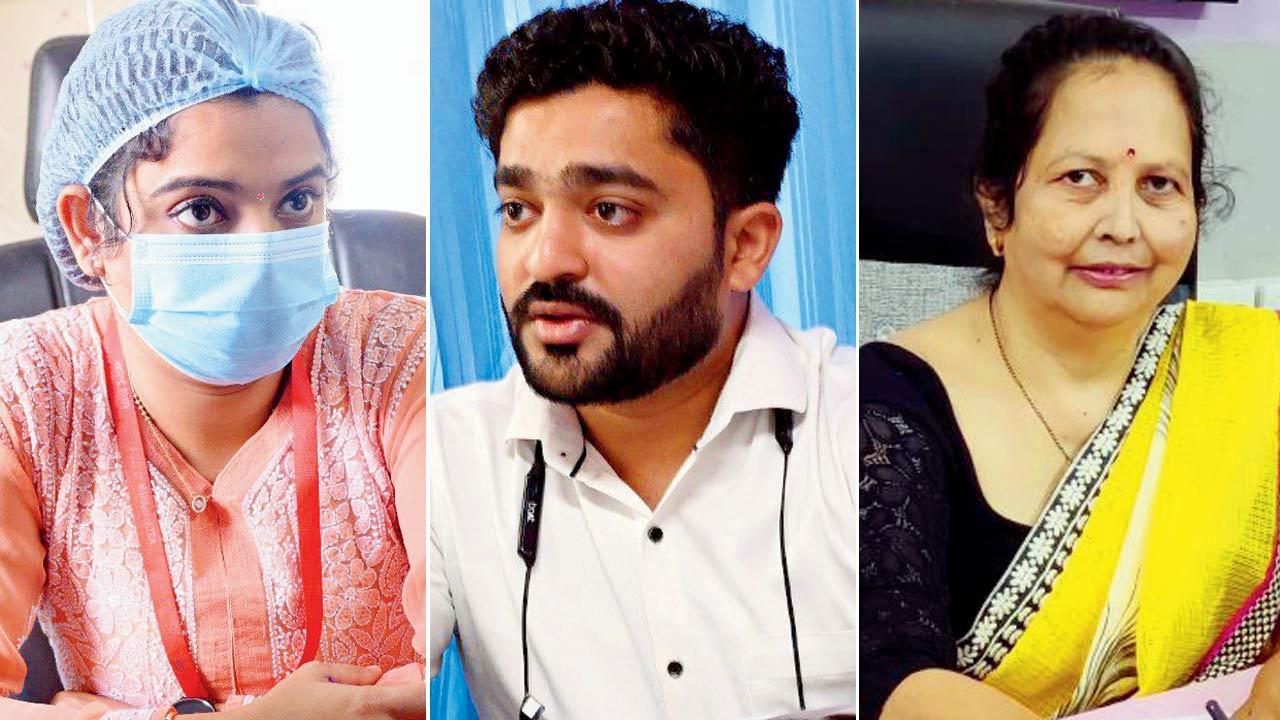 Dr Netra Patil, Dr Suraj Mhatre and Dr Archana Singh. Pics/Sayyed Sameer Abedi
Dr Netra Patil, Dr Suraj Mhatre and Dr Archana Singh. Pics/Sayyed Sameer Abedi
Raigad District Zilla Parishad’s Chief Executive Officer Dr Bharat Basetwad said he was not aware of the issue, but promised action. “I will personally speak to the Civil Surgeon of Raigad District, get first-hand information from all health officials, and immediately carry out awareness campaigns in these tribal areas. Pen has a Project Director rank officer for Tribal Welfare, handling three districts—Raigad, Ratnagiri and Sindhudurg—who can check what is happening on the ground.”
Atmaram Dabe, Project Director, Integrated Tribal Development Project (ITDP), Pen, said he would look into the issue. “I have taken charge two months ago, and have not come across such instances. The health department may have information on the same,” he said.
Sandeep Bhagul, Senior Police Inspector at Pen, who took charge a few months ago, said community pressure hampers progress of cases. “We do register offences under POCSO, as and when the complaint is received or we are intimated by the local health authorities. However, once the case is lodged and the accused arrested, the parents do not cooperate much during the trial due to community pressure, and our efforts to nail the culprit go in vain. We have started conducting counselling sessions in these hamlets, and we will intensify our visits.”
Advocate Audrey Dmello, Director of the NGO Majlis, said, “In most cases, the perpetrator of the crime is someone closely related, staying under the same roof, within the family, or a school bus staffer or tutor or the neighbourhood, or a romantic partner where the girl is lured to have physical relations. Registering a police complaint is not easy in most cases and it is worse in rural areas, due local political and influential community pressure.
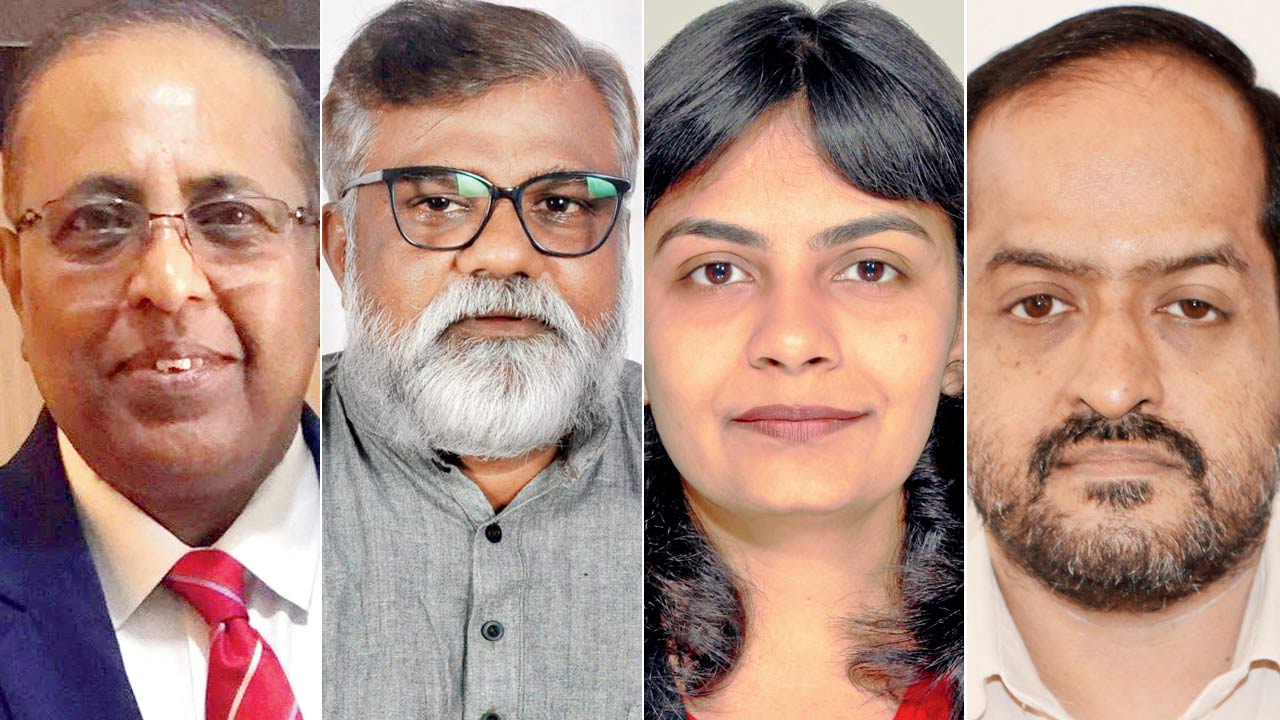 Nishit Kumar, Santosh Thakur, Solicitor Stuti Galiya and Venkatesh Nayak
Nishit Kumar, Santosh Thakur, Solicitor Stuti Galiya and Venkatesh Nayak
Moreover, due to lack of education and understanding of legal proceedings, the victim and parents continue to be under tremendous stress and easily fall prey to pressure tactics from the community head or accused family, she added.
According to Dmello, the problem worsens when the minor has crossed four months or is in an advanced stage of pregnancy, and no Medical Termination of Pregnancy (MTP), is possible without court permission. The court relies on the report of the expert medical board constituted under the Grant Medical College and JJ Group of Hospital, as per directives.
If the girl has to be admitted to hospital under police care, her emotional and mental trauma is worse, especially when she has to undergo an MTP and is not sure whether this is a sin, Dmello said. In case she is in an advanced stage of pregnancy, she has to stay in a government- or civic-run labour ward till term. These victims themselves are in need of protection and care, unaware about the internal and external changes in their body, and need counselling support, she added.
A case Majlis has undertaken is that of a minor tribal girl, who dropped out of school when she became pregnant. The accused, who stays in the vicinity, refused to marry her after police arrested him under POCSO.
“Though from a poor background, the victim decided to deliver the baby, who is today two years old and the mother 17. We are struggling to get the child her birth certificate and Aadhaar card made since the last one year, so that they could be registered under various state / central government social security schemes, but in vain,” said Dmello.
“The Bal Sangopan Yojana provides a monthly financial aid of Rs 2,250 (earlier Rs 1,100) for health, education and nutrition till the child attains 18 years of age. Both the mother and child could have been supported financially, had the birth certificate and Aadhaar card been in place,” she added.
Majlis offers legal counselling to women and children facing sexual and domestic violence. For assistance call their helpline —07506732641.
Nishit Kumar, Founder and Managing Director of Centre for Social and Behavioural Change Communication, said, “Maharashtra is India’s no.1 GDP state, and has been ranked third on governance. Almost 200 years ago Savitribai Phule established education for girls—we just celebrated her birth on January 3. However, the facts of the state as per the National Family Health Survey (NFHS-5) 2019-2020 are:
. Nearly 10 per cent of all teenage girls in the age group of 15-19 were pregnant at the time of the survey—that is one in every 10 teenage girls.
. Of these pregnant girls 20.1% per cent had no schooling, 26.1 per cent had less than five years of schooling, 11.7 per cent completed between five and nine years, only 5.3 per cent completed 10-11 years of schooling and only 4.9 per cent completed 12 or more years of schooling.
. 76.8 per cent of mothers surveyed were moderately to severely anaemic.
. Child stunting was over 40 per cent.
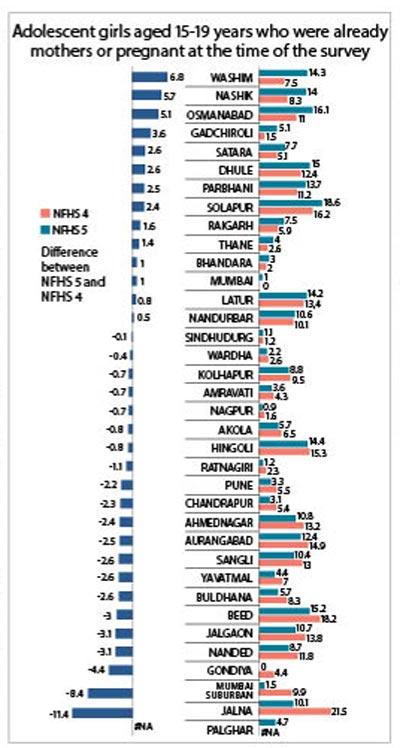
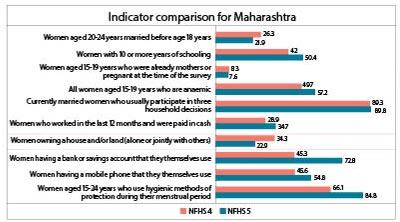
“The NFHS survey is done once in four years and the questions are asked to women of age 20-24 years. To determine both child marriage as well as teenage pregnancy the question asked pertains to age of the first child, the second child and so on. However NFHS doesn’t measure the current year’s status of either child marriages or teenage pregnancy—presumably because answers to such questions would not reveal the truth. Hence the NFHS data is always underrepresented and reflects past data. This, in spite of the fact that institutional deliveries are reported at near 100 per cent in the state. For some reason, the health department does not generate data on the mother’s age at time of delivery, even though every hospital— private or government—records it,” said Kumar.
Teenage pregnancies demonstrate the failure of both the educational systems to keep girls in school, and of social schemes that provide for girl children in order to encourage parents to educate girls. Besides, getting young girls to bear the burden of pregnancy and child-rearing at an age when they want to study and play is torture—not to mention the lack of agency among girls and their right to education,” he said.
Kumar cited the example of a woman who was a “bai” at a hospital in Dhule, whom he met in July. “She told me she was married at age 13 and sent to her in-laws’ house in a different village. There she saw kids of the family playing and would join them until she was pulled out by her mother-in-law and beaten. She ran away several times to her parents’ home but her father always took her back to the in-laws. Her eyes filled with tears and a deep anger as she narrated this part of her life. She was pregnant at 15,” he said.
Adding to the complicated scenario, officials in districts with significant tribal populations routinely state that tribals do not follow marriage rituals and just start staying together (a practice that is now growing in urban areas as live-in relationships, which the Supreme Court has recognised and accepted as a valid form of companionship). The government, however, is torn between directions to preserve tribal ways of life and the need to integrate them into mainstream life with access to modern medicine, education and jobs. As a result, governments do not customise messaging for social schemes, education, laws etc for tribals.
And so they live—on the periphery of modern life and yet not a part of it.
That said, there have been some highly motivated District Collectors who have made strong efforts to get tribes to be a part of modern systems. But they are the exception to the rule, Kumar said.
“Indian customary laws, including certain tribal practices that permit cohabitation without marriage and allow underage girls to engage in relationships leading to early pregnancies, present a critical conflict with the constitutional rights and protections afforded to women and minors. While the Fifth Schedule of the Constitution emphasises the autonomy of Scheduled Areas and the preservation of tribal customs, this autonomy cannot operate in isolation from the moral and legal principles enshrined in the Constitution,” said Advocate Mohini Priya, Advocate on Record, Supreme Court of India.
“Statutory frameworks such as the Protection of Children from Sexual Offences (POCSO) Act, which criminalises sexual activity with minors, and the Constitution’s mandate to uphold fundamental rights, particularly for vulnerable groups, cannot be undermined by customary practices,” stressed the advocate, adding, “Such practices, including underage cohabitation or early pregnancies, directly contravene Article 21, which ensures the right to live with dignity, and Article 14, which guarantees equality before the law. Legislative intent behind POCSO clearly establishes that protecting minors from exploitation is a non-negotiable priority. Attempts to exempt Scheduled Areas from such protective legislation under the discretionary powers granted to governors by the Fifth Schedule pose serious questions about the balance between cultural autonomy and constitutional safeguards.”
Advocate Mohini also said that India’s international obligations, particularly under the Convention on the Elimination of All Forms of Discrimination Against Women (CEDAW), further reinforce the need to eliminate practices that compromise the dignity, autonomy, and health of women and minors. The persistence of patriarchal traditions within certain tribal communities, coupled with inadequate legal protections, risks perpetuating systemic violations of constitutional and sexual rights.
“Judicial precedents, such as Shayara Bano v Union of India and Joseph Shine v Union of India, have firmly established that customs and traditions inconsistent with fundamental rights cannot be sustained. The judiciary has repeatedly emphasised that the supremacy of the Constitution must prevail over any practice, however culturally entrenched, that infringes upon basic human rights,” said Mohini.
“While the cultural relevance of tribal laws should be respected, they must be subjected to Constitutional scrutiny to ensure they do not perpetuate prejudice or harm vulnerable communities. The harmony between tribal sovereignty under the Fifth Schedule and the overarching Constitutional mandate is essential for safeguarding the rights of women and children, reinforcing the principles of equality and dignity, and ensuring justice for all. Only by aligning customary practices with constitutional values can India truly fulfill its commitment to upholding justice and protecting its most vulnerable citizens,” she said.
Venkatesh Nayak, Director of Commonwealth Human Rights Initiative (CHRI), New Delhi said, “Both preventive and remedial measures must be taken on a war footing to tackle this phenomenon. Starting with the provision of an adequate means of livelihood for the parents of these girl children, the government agencies must concentrate on a multi-pronged approach to deal with the issue, such as institutionalising healthcare and counselling facilities for these girls. Sex education and behaviour change communication must focus on those responsible for the teenage pregnancies and not just the girl children.”
Nayak added that registrars of births and deaths as well as UIDAI officials “must get out of their ivory towers” and set up camps in these villages to provide birth certificates and other identity documents to the unwed mothers and their babies. “The criminal justice system must act swiftly to penalise those responsible for the predicament of these teen mothers under the applicable laws like POCSO, without exception,” he added.
The newly constituted team at the NHRC must take up this issue immediately and devise rehabilitation measures for these girl children on an emergency basis, Nayak said. Specialist NGOs should team up with Departments of Social Work and qualified psychiatrists to launch community counselling initiatives to erase the stigma that is forced on these girl children. “Beti bachao, beti padhao sloganeering has to become a living reality for these disadvantaged female citizens who are often ignored and treated like the dregs of society,” he averred.
Solicitor Stuti Galiya said “Sexual abuse cannot be allowed in the garb of culture and traditions. Traditions and conventions cannot be used as a medium to endanger the lives of young girls, especially from low socio-economic backgrounds who fall under the vulnerable category, because of lack of information, education, and means to exercise decision-making authority.”
India has some of the toughest laws on the topic, such as the POCSO Act, 2012, the Bharatiya Nyaya Sanhita, and the Medical Termination of Pregnancy Act. Because of the multiplicity of regulations, sometimes there is ambiguity on various aspects. Coupled with this, the focus of the existing laws is more on procedural and punitive aspects, which involves extensive paperwork, mandatory police reporting, permissions from judiciary, increased police interactions, which becomes an overall traumatic and intimidating experience for the victim and her family, she said.
Apart from this, Galiya said, the courts have time and again passed various landmark judgments stressing the government’s obligation to ensure the girl child’s safety and their duty to prevent her from being abused. However, on the ground, the reality is that implementation of these laws is poor, with delays in prosecutions due to the overburdened nature of courts and stigmatisation in most cases. Even if the victim and her family gather the courage to raise their voice, considering the lacunae and other procedural issues with the justice delivery system in the country and the attached social stigma, the victim is often left frustrated and helpless. When the wrongdoer is released on bail within a few weeks, the victim and her family live in constant fear of revenge. There is definitely a need to ensure that law is not just left on paper. A balanced approach needs to be taken to ensure that there is no abuse of the process of law in the quest of criminalising the wrongdoer, but at the same time ensuring that no leniency is shown in genuine cases.
“A positive change will only be seen when civil society, policymakers, law enforcement, and judiciary work together to raise awareness,” said Galiya. “It is important to harmonise the legal framework and address areas of ambiguity. State-specific legislation (in addition to national legislation), keeping in mind local customs and traditions, will prove effective. It is important to create better social welfare frameworks to identify vulnerable children or those who have had experience of maltreatment. Different state machineries, such as police and medical staff need to adopt an empathetic and sensitive approach rather than making it an intimidating experience for the victim and her family.”
5
Avg no. of unwed teenage pregnancies reported per month at sub-district civil hospital in Pen
Impact of child marriage
Insecurity of survival and protection:
. Early delivery due to child marriage is a risk to girls’ life and health. Possibility of death due to childbirth complications, frequent pregnancies. Early responsibility of the family leads to domestic violence, less employment opportunities and early workload, financial exploitation of the girl child.
Deprivation of overall development and participation:
. Financial dependence due to incomplete education of girls and lack of access to skills. Separation from family and friends after marriage. Deprivation of social participation.
Courtesy: Centre for Social and Behavioural Change Communication, Mumbai
Reasons for child marriage
Multidimensional poverty
. Scarcity of basic facilities like health, roads etc
. Lack of livelihood options
. Lack of education opportunities
. Marriage is used to pay off debt to avoid the responsibility and reduce the expenses
. Opportunities for migration
Ignorance of law and its importance
. No awareness about the law
. Social rituals and traditions
. Less education
Natural and man-made disasters
. Drought, flood and scarcity of water
. Covid-19, lockdown and loss of production
. Farm loss and debt
Social and cultural elements
. Concerns about girls’ sexuality and safety
. Girls are valued less than boys — rights, behaviour, opportunities and status of girls and boys
. The notion that girls are incapable of making decisions
. Getting girls married without investing in their education, treating them as “paraaya dhan”
. Child marriage is socially accepted
Migration and child marriage
. Marriage of a minor boy or girl increases the family income
. Not sending girls to school so that they look after the house
 Subscribe today by clicking the link and stay updated with the latest news!" Click here!
Subscribe today by clicking the link and stay updated with the latest news!" Click here!







